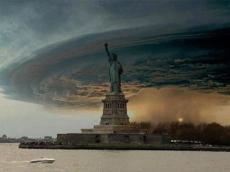|
|
TODAY.AZ / Weird / Interesting
Climate scientist say Hurricane Sandy is 'no coincidence'
28 November 2012 [21:50] - TODAY.AZ
 Officials at a U.N. meeting on climate change in Doha, Qatar have cited the support of scientists in claiming that devastating storms like Hurricane Sandy are not purely "coincidental" but actually affected by global warming.
Officials at a U.N. meeting on climate change in Doha, Qatar have cited the support of scientists in claiming that devastating storms like Hurricane Sandy are not purely "coincidental" but actually affected by global warming.America also had to defend itself against accusations that it has not been doing enough in the battle against global warming, and has failed to help poor nations that have been most affected by it.
The accusations stemmed from former President George W. Bushes' decision to drop the Kyoto Protocol, a 1997 treaty limiting emissions of heat-trapping gases by industrialized countries.
"Those who don't follow what the U.S. is doing may not be informed of the scale and extent of the effort, but it's enormous," said U.S. delegate Jonathan Pershing in response to the accusations.
He pointed out that the Obama administration has taken up a number of initiatives, including increasing fuel efficiency standards for cars and trucks, and providing financial assistance for poor countries to equip them with technologies to combat climate change.
"It doesn't mean enough is being done," Pershing added. "It's clear the global community, and that includes us, has to do more if we are going to succeed at avoiding the damages projected in a warming world."
As the Northeastern coast of the U.S. continues recovering from October's devastating Hurricane Sandy, which killed hundreds of people in the Caribbean and U.S. and cost billions of dollars in property damage, some scientists on the U.N.'s climate panel have suggested that global warming most certainly played a role in the development of this natural disaster.
Jean-Pascal van Ypersele, the vice chairman of the Intergovernmental Panel on Climate Change and U.N. climate panel's No. 2 scientist said that Sandy was "probably not a coincidence," and claimed this further evidence will show that climate change certainly plays a role in these storm formations.
"The new question should probably progressively become: 'Is it possible that climate warming has not influenced this particular event?'" he told The Associated Press in an interview on Tuesday.
Although global warming and climate change remain controversial issues in some circles, the AP notes that many climate scientists and hurricane experts have come to the conclusion that as global climates warm up, the number of hurricanes will decrease – but storms that do develop will be bigger and stronger, much like Sandy.
URL: http://www.today.az/news/interesting/115843.html
 Print version
Print version
Views: 1824
Connect with us. Get latest news and updates.
See Also
- 19 February 2025 [22:20]
Visa and Mastercard can return to Russia, but with restrictions - 05 February 2025 [19:41]
Japan plans to negotiate with Trump to increase LNG imports from United States - 23 January 2025 [23:20]
Dubai once again named cleanest city in the world - 06 December 2024 [22:20]
Are scented candles harmful to health? - 23 November 2024 [14:11]
Magnitude 4.5 earthquake hits Azerbaijan's Lachin - 20 November 2024 [23:30]
Launch vehicle with prototype of Starship made its sixth test flight - 27 October 2024 [09:00]
Fuel prices expected to rise in Sweden - 24 October 2024 [19:14]
Turkiye strikes terror targets in Iraq and Syria - 23 October 2024 [23:46]
Kazakhstan supplied almost entire volume of oil planned for 2024 to Germany in 9 months - 23 October 2024 [22:17]
Taiwan reported passage of Chinese Navy aircraft carrier near island
Most Popular
 Eurasian logistics without Azerbaijan? An untenable myth
Eurasian logistics without Azerbaijan? An untenable myth
 President Ilham Aliyev receives ADB delegation
President Ilham Aliyev receives ADB delegation
 Central Asian leaders to sign major multilateral package at 7th Consultative Summit in Tashkent
Central Asian leaders to sign major multilateral package at 7th Consultative Summit in Tashkent
 Azerbaijan highlights smart and green urban development at COP30 in Brazil
Azerbaijan highlights smart and green urban development at COP30 in Brazil
 National Library participates in international congress
National Library participates in international congress
 Leyla Aliyeva participates in environmental initiatives during Mingachevir visit
Leyla Aliyeva participates in environmental initiatives during Mingachevir visit
 Azerbaijani Justice Minister meets with Georgian counterpart in Baku
Azerbaijani Justice Minister meets with Georgian counterpart in Baku
